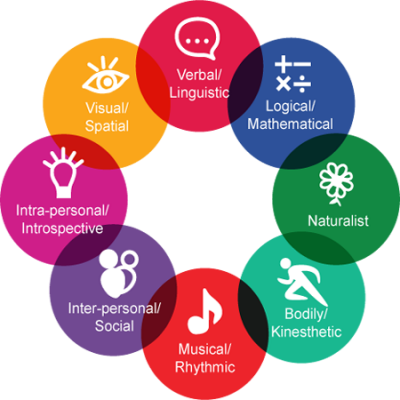Types of Multiple Intelligence
After years of extensive research, Prof Howard Gardner defined 8 intelligences. The multiple intelligences he defined are:
- The ability to think in pictures and visualize future results.
- The ability to imagine things in your mind's eye.
- The ability to perceive spatial information.
- Those with strong spatial intelligence are often proficient at solving puzzles.
- This intelligence is high in artists, photographers, pilots, painters, and architects.
- The ability to read, write, and communicate with words.
- The ability to use language to express one's thoughts and to understand other people orally or in writing.
- They tend to learn best by reading, taking notes, listening to lectures, and discussion and debate.
- This intelligence is high in writers, lawyers, philosophers, journalists, politicians, and teachers.
- The ability to distinguish among an individual's own feelings, to accurate mental models of themselves, and use them to make decisions about life.
- The capacity to know one's self; careers which suit those with this intelligence include philosophers, psychologists, theologians, writers, and scientists.
- The ability to reason and calculate.
- Enables individuals to use and appreciate abstract relations.
- The ability to manipulate numbers, quantities, operations, etc.
- Many scientists, mathematicians, engineers, doctors, and economists function at this level of intelligence.
- Allows one to distinguish among, classify, and use features of the environment. The ability to discriminate among living things and to see patterns in the natural world.
- Careers which suit those with this intelligence include wildlife photographers, naturalists, conservationists, gardeners, and farmers.
- Enables individuals to recognize and make distinctions among others' feelings and intentions.
- The ability to work effectively with others and display empathy.
- Careers which suit those with this intelligence include politicians, managers, teachers, and social workers.
- Allows individuals to use all or part of one's body to create products, solve problems, or present ideas and emotions. Using the body in highly differentiated ways for expressive, recreational, or goal-directed purposes.
- People who have this intelligence usually enjoy acting or performing, and in general, they are good at building and making things.
- Careers which suit those with this intelligence include athletes, dancers, actors, surgeons, builders, and soldiers.
- As you know, the Indian education system focuses more on cramming information in the minds of our children, rather than giving them true knowledge, which they can use to shape a successful career. Our system also overlooks the specific learning needs of each child, who is unique, resulting in immense stress.
- Shockingly, over 12,000 students commit suicides in India due to exam-related stress. This number is alarming and makes us wonder where our system is going wrong.
- You, as parents, need to take an active role in understanding the special intrinsic potential of your child, and design suitable learning methods around your child's needs. The DMI Assessment technique has been developed by scientists and research experts from world-renowned universities and is based on knowledge from genetics, embryology, dermatoglyphics, psychology, and neuroscience.

